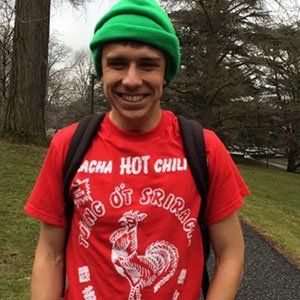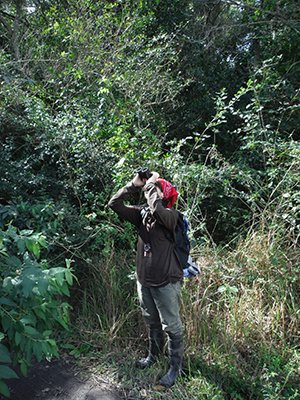Paul Green ’16 isn’t the first college student to hop in the car with a friend for a cross-country summer adventure. But he might be the first to do it to investigate Thai chili hot sauce.
The Honors history major loves Sriracha. How much? Deriding Pennsylvania cuisine, he puts the arrival of the fiery sauce “right up with the Continental Congress on the list of best things to happen to the state.”
Green’s zeal for the red rooster took him almost 3,000 miles to California to answer a burning question: “How did a cheap hot sauce go viral?”
“Because the story of Sriracha draws upon so many different realms of our cultural life,” says Green, of Belmont, Mass., “a day could find me interviewing food bloggers or journalists, meeting up with ‘local’ or ‘artisanal’ Sriracha producers, interviewing restaurant workers in Chinatown, sitting for hours with young people or older folks there who are involved in the local history, or touring a factory.
“It’s something I had been wanting to do for a long time,” he adds, “but I didn’t know it would be so rewarding.”

The zeal Paul Green '16 has for Sriracha took him nearly 3,000 miles to explore how the hot sauce went viral.
Green's flavorful summer journey was made possible by funding from the College. He is one of the nearly 200 Swarthmore students funded for summer research projects through the Provost’s Office, Lang Center for Civic & Social Responsibility, and Dean’s Office this year. Swarthmore provided almost $800,000 in all, through endowed scholarships and internships, awards from the Provost's Office or academic divisions, and faculty grants.
More than half of the students conducted research on campus, and the rest followed their interests elsewhere in the U.S. or abroad. Some worked side by side with faculty advisers, while others checked in periodically. The through-line for the students, though, was a chance to gain experience in the field while broadening their horizons.
Literally, in the case of Nicole Banales ’18, of El Paso, Tex., who wanted a glimpse of a career in astrophysics. She spent her summer searching for a circumbinary planet, which orbits two stars instead of one.
Banales and two other students arranged a telescope to observe the stars overnight. To her surprise, though, the project was more technical than optical.
“Every step that we took required programming,” she says. “Having not taken any computer science classes, I had to learn it from scratch. It tested my patience, but it also taught me a different way of thinking and has given me a new way to interact with data.”
The sights of Jesse Bossingham ’16 are set on medical school, but this summer he pursued political economy research. Exploring whether economic ideas lead or lag economic policies, Bossingham dove into the history of macroeconomics and the Federal Reserve and analyzed reams of text.
“I’ve gained a much more nuanced understanding of the research process, especially how in the weeds it can feel for most of the work,” says Bossingham, an Honors economics and political science major from Clinton, Wis. “But that same lost feeling allowed me to explore lots of different threads and was the purest ‘learning for learning’s sake’ that I’ve ever experienced, which was incredible.”
Also stationed behind a desk this summer was Cara Ehlenfeldt ’16, who translated a Russian children’s book into English. A typical day for the linguistics and languages special major was one or two hours of translating, which was more rigorous than it may sound.

Leonie Cohen ’16 locates and records behavioral data on owl monkeys in the forests of Argentina.
“Translating a book is more than a matter of moving a sentence from one language to another,” says Ehlenfeldt, of Tabernacle, N.J. “There’s culture, humor, and nuances throughout the text that require some lexical somersaulting.”
Keeping three Russian dictionaries, Russian Google, and an English thesaurus open in her browser, she toiled in the hopes of helping to bridge the cultural gap between Russian and American children. Her takeaway: “Translation is creativity with responsibility."
“You’re not just representing yourself when you put words on paper,” says Ehlenfeldt. “You have an author and two languages that you’re accountable to in every translation choice you make.”
Katherine Zavez ’17 and Philip Queen ’16 also felt a great sense of responsibility to their ripped-from-the-headlines topic: wildfires. The students studied the relative effects of human influence, such as forest roads, versus biophysical factors on burn severity and boundaries.
“We wanted to study wildfires since they’re a growing problem, and their research can make a difference in the conservation of national parks and forests,” says Zavez, a mathematics major from Winchester, Mass., also stressing global ramifications for climate change.
Zavez and Queen, a philosophy major from Richmond, Va., spent most of their days doing geo-processing and spatial analysis of boundaries and burn severity in the lab. But they occasionally ventured out into the Crum Woods with advisor G. Narayanaraj, visiting assistant professor of environmental studies, to learn how to take field measurements and collect their own data.
Collecting data a continent away in the forests of Argentina was Leonie Cohen ’16, who followed her passion for primatology to the Owl Monkey Project, which explores the nocturnal monkeys’ genetic structure.
Every Monday morning, Cohen and her team drove into the field with enough food and potable water to last them the week. She headed into the forest at 6 a.m. to position telemetry equipment to locate monkeys, record behavioral data, and collect fecal samples. After a long day, the team returned to camp, fired up the generator, and dumped data onto iPods.
Cohen brought back a wide range of lessons, including a few that may not turn up on her resume.
“I learned what little owl monkey poop pellets sound like when they hit the ground, what it feels like to have spider webs in your eyelashes, and that howler monkeys sound like a combination of ghosts, wolfs, dying pigs, a highway, and nightmares.
“I’m so grateful to Swarthmore for making this incredible experience possible,” she adds. “It’s been life-changing.”








